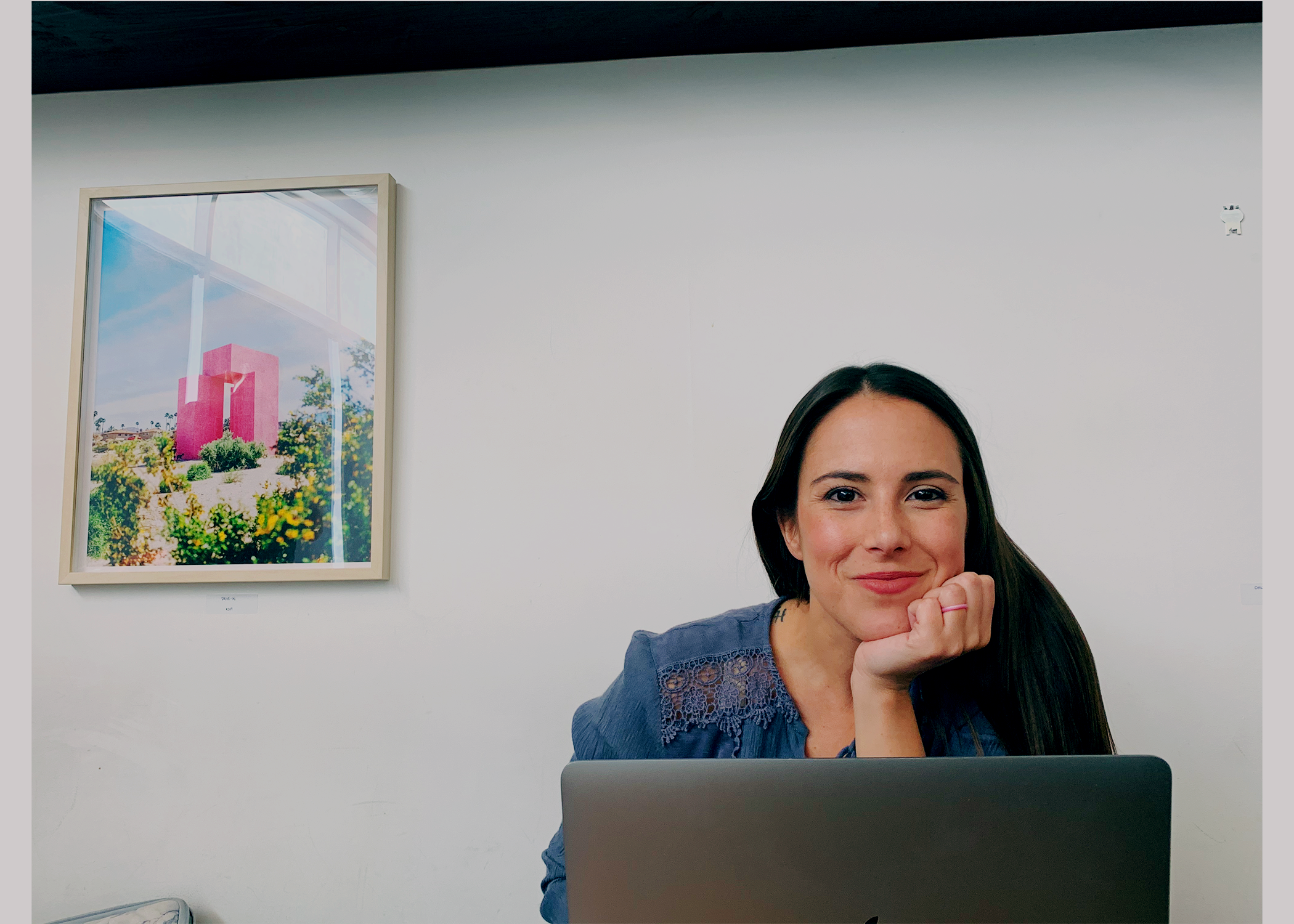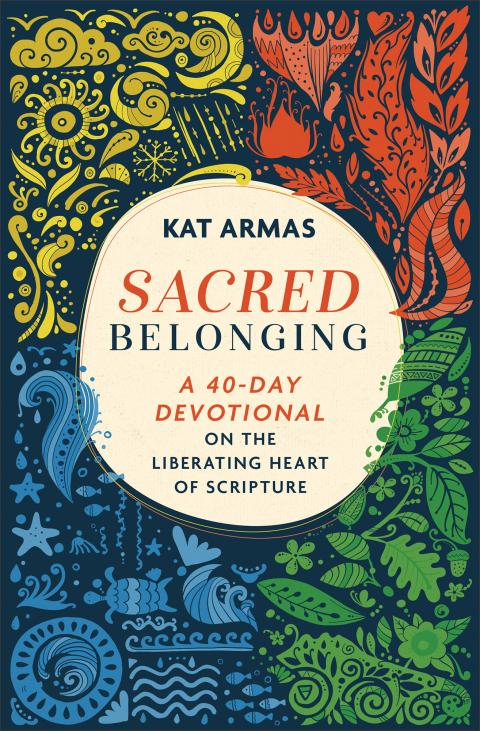
Kat Armas is a Cuban American writer and speaker. She hosts "The Protagonistas" podcast, where she highlights stories of everyday women of color, including writers, pastors, church leaders and theologians. She is the author of Abuelita Faith and Sacred Belonging. (Courtesy of Brazos Press)
Editor's note: To kick off the new year, EarthBeat is sharing four creation-themed devotions from Kat Armas' book "Sacred Belonging: A 40-Day Devotional on the Liberating Heart of Scripture" (Brazos Press, a division of Baker Publishing Group, Sept. 12, 2023, used by permission).
Subscribe here to the EarthBeat Reflections e-mail list to receive these devotions in your inbox on Jan. 1, 8, 15 and 22, as well as future spirituality content from EarthBeat.
All go to the same place; all come from dust, and to dust all return.
—Ecclesiastes 3:20 (NIV)
We got the news late one Sunday morning in mid-July that my father-in-law had died unexpectedly.
The phone rang loudly that day. Not only did the noise startle my spouse, Taylor, and me as we prepared to head out to grab lunch, but it also disrupted our lives — steering us in an unexpected direction — the way those dreaded phone calls always do. As soon as Taylor answered, we knew it was bad news. His grandfather's words pulsed through the phone like a heartbeat: "It's your dad. He's gone. I'm so sorry." I felt my heart sink deep into my body, where our daughter had been growing for seven months. Taylor's pale skin began losing its pink hue, the room starkly silent, except for his shallow breathing. I threw my arms around his chest as if to catch him, but my pregnant belly got in the way. After he hung up the phone, we lingered for what seemed like hours before Taylor packed up the car and made the difficult drive to the small country house where his father had raised him.
My father-in-law lived alone, nestled in a few acres of rural land, unburdened by the glare of city lights or the numbing buzz of cars and construction. The first time I visited, the quiet was so loud it made my ears ring as if they were detoxing. It was uncomfortable, but I didn't resist. I knew I needed it.

It was this quiet — and the simplicity that comes with it, I imagine — that enamored my father-in-law to life in the countryside. That kind of life felt foreign to a city girl like me, but Taylor remembers it with fondness: spending weekends with his knees in the dirt and the soil underneath his fingernails — responding to the needs of the earth like a trusted friend. These are the virtues that formed him.
It came as no surprise, then, that his father was working outdoors when his time came: tending to his land with the same love and devotion he had for years. It wasn't until a few days later that his friends found him lying in the dirt. It was a kind of poetry, taking his final breath on the land he spent his life cultivating — a land that loved him back. It was this relationship that sustained him until his heart gave out. They say he was alone when he died, but I imagine he felt far from it in the presence of the oak tree that hovered above him like a protective guardian.
According to some Indigenous traditions, humans don't claim the land; it is the land that claims us. This is in stark contrast to a colonizing mindset that views land as a commodity to be staked out and sold off. I imagine my father-in-law knew this truth intimately, its power embracing him as he lay to rest as one with the earth that claimed him.
In the opening chapters of Genesis, the Bible affirms a mutual and cyclical relationship between dirt and our bodies. The Bible is far from a book of science, but both agree on this point. Science teaches us that all the elements that make up the human body are found in the soil. This is a testament to what we already know to be true: we belong to the earth, and she belongs to us too.
The "balance of nature" is one of the earliest — and most widely known — theories about the natural world proposed by philosophers and scientists. It suggests that all things are held in a delicate balance with every other entity, with each entity so finely and intricately interwoven that if one is added or taken away, things can potentially go awry. Take, for instance, the case of the decimation of wolves in Yellowstone National Park.
In the 1920s, wolves in Yellowstone were eradicated due to pressure from ranchers worried about their livestock. Before long, elk numbers increased because their predators were gone. But more elk meant that grass and saplings were overgrazed. Soon beavers disappeared and the riverbanks were left barren. The entire landscape was decimated, killing off species of birds that relied on the foliage for nesting. Because there was no longer any plant life to protect the ground, flooding washed away the soil and erosion progressed, changing the flow of rivers.
This extraordinary course of events was all due to the eradication of wolves, their place in the ecosystem so crucial that eliminating them meant rivers changed course and certain species could no longer survive there.
Advertisement
Everything has a place in the ecosystem; however, the balance of nature theory has also been challenged by ecologists who claim that human activity constantly disturbs the environment. These disturbances (like killing off wolves in Yellowstone) lead to chaotic and dynamic changes, yet they purport that this is the norm in nature. Because humans are an unpredictable part of the ecosystem, a new equilibrium occurs when habitats change — although not necessarily for the better. In recognition of this, humans reintroduced wolves in Yellowstone in 1995, stabilizing its ecosystem once again.
Our world is both stable and chaotic, balanced and dynamic. Both states exist together yet still affirm the truth that we are part of a web of diversity that needs every creature — from beetle to elephant to deciduous leaf — to function in its fullness. Caring about deforestation and the loss of animal species is a worthwhile endeavor because everything responds to everything else. What happens to the earth happens to us.
In Matthew's Gospel, the story goes that when Jesus was dying, the earth went dark for three hours (27:45). At the moment he cried out and took his last breath, the land shook and the rocks split (27:51). Some interpreters might say this speaks to the supremacy of Jesus over creation, and maybe that's true — particularly when read through a Western lens of hierarchy. But perhaps it's more than that. In Colossians, Paul says that in Jesus all things are held together (1:17), so would it be farfetched to think that the cosmos would tumble into a kind of chaos at his death? I like to imagine that the earth was responding to her relationship to Jesus in a divine connection of sorts.
Through Jesus, God became one with us in this intricate web of life, experiencing alongside us the fullness of what it means to be human. Perhaps the death of Jesus is also a lesson about the interdependency of all things.
Indeed, nothing happens in our world that doesn't affect something else. When wolves were eliminated, rivers changed course and bird species died out. When Jesus took his final breath, the earth shook and the rocks split. Our world and everything in it tell a story of belonging — a belonging established at the very beginning, in accordance with God's desire for all of creation to be in concert together.
A few days after Taylor's dad died, we found ourselves drowning in paperwork, account numbers, phone calls, and grief. We woke up early one morning and took the long stretch of rural country road to the courthouse to continue figuring out all the things you need to figure out after a parent dies unexpectedly. During this silent drive, we saw a billboard that read, God recycles. He made you from dust.
We laughed. It felt so fitting.
From dirt we come and to dirt we will return.
It is through the dirt that we are bound together in a sacred belonging.
- Reflect on the last time you felt like you belonged to a web of life larger than yourself.
- What cultivates belonging in your life?
- What can you nurture with your own hands that connects you to our ecosystem?






